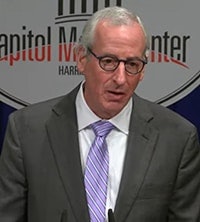
A bipartisan pair of Pennsylvania state senators touted their adult-use cannabis bill back in February. Seven months later, its formal introduction still awaits.
But a House tandem beat them to the punch Tuesday, as Democratic Reps. Jake Wheatley and Dan Frankel announced House Bill 2050, the “Cannabis Regulatory Control Act,” which aims to legalize the possession of up to 1 ounce of cannabis or 5 grams of concentrate for personal use for adults 21 years and older in the commonwealth.
The bill has evolved since Wheatley, the chair of the House Professional Licensure Committee, first introduced similar legislation in 2017. Key pillars of the current bill include: creating access and opportunity for diverse businesses, individuals and communities; enhancing social and economic equity; and providing provisions for automatic criminal justice reform.

Wheatley said while he’s heard his associates in the opposite chamber of the General Assembly claim to have the gold standard with their adult-use proposal, he thinks H.B. 2050 provides the “industry standard.”
“For some, it’s an economic question. For others, it’s a question around access and opportunity. But the baseline for why I’ve been harping on this for as long as I have is the social and criminal justice reform aspects,” Wheatley said during a Sept. 28 press conference. “And so, again, we really think there are components in our bill that frees up our criminal justice system so that our law enforcement and agencies, and spaces in our correctional institution, can be opened up and freed to really go after more significant, impactful crime and activity.”
The most important part of the legislation seeks to repair some of the damage caused by generations of harmful policy, such as criminalizing and mass incarcerating people of color, which has done little more than hinder people’s ability to get jobs, education and loans, Frankel said.
But the “far-reaching” bill goes a step further to ensure Pennsylvania’s cannabis policies are in the public interest, he said.
“It creates a framework to protect the public health,” he said, referencing an outbreak of lung illness connected to 2019 vape cartridges where vitamin E acetate had been added as a thickening agent or to dilute THC oil.

The only way to make sure that cannabis is safe is to regulate it, monitor it and to take bad products off the market, Frankel said.
“Failed cannabis policies of the past have resulted in the worst of all possible worlds,” he said. “Not only did we have aggressive enforcement of laws that harm communities of color, we failed to appropriately protect the health of the public and lost out on significant revenue. Instead of making money off the sales of a product overseen for safety and quality, we have sent people to illegal sources for unsafe products and have spent money to prosecute them.”
The legislation would create a Cannabis Regulatory Control Board to serve as the primary oversight arm for the legal and regulatory framework. H.B. 2050 also aims to establish multiple grant programs that would benefit small, minority- and women-owned businesses in Pennsylvania.
The grant programs would be funded by revenue collected from a 13% cannabis excise tax on retail sales. The legislation also calls for a 7% privilege tax on cultivators and processors, a municipal tax at a rate of no more than 2% on retail sales, and either a 1% or 2% tax on the sale or transfer of cannabis and cannabis products by a cultivator, processor or other person engaged in regulated activity to a cannabis retailer.
The revenue would also go toward creating a Communities Reimagined and Reinvestment program, which, among many opportunities, could administer legal services to address barriers to reentry, including expungement or pardons.

The breadth of thought that went into drafting the legislation is evident through language addressing several barriers and sustainability for small businesses, said Amber Littlejohn, executive director for the Minority Cannabis Business Association.
“These provisions that help with access to capital, address barriers to entry and create pathways for small Pennsylvania businesses to participate in this industry [also] help those who have been most impacted by prohibition,” she said. “And they are going to help this industry in Pennsylvania—the legal cannabis industry—be built by Pennsylvanians and for Pennsylvanians.”
The legislation also goes a long way toward providing a pathway for small family farmers to participate in the industry, said Michael Kovach, vice president of the Pennsylvania Farmer’s Union. Kovach painted a picture of farmers in the commonwealth who kept food on Pennsylvanians’ tables throughout the pandemic yet often struggled to pay bills at the end of each month.
“The folks who grow things to feed us are at least as logical a choice to grow this crop, should it become legal, as the large out-of-state interests that dominated the medical market when it was rolled out,” he said. “The barriers to entry were just too great for many family farmers to avail themselves to that market. It’s a potential farm-saver. We’ve gotten a lot of eggs in a very few baskets, and anything we can do to diversify production and income on family farms is of note and very important.”
Another measure calls for a Cannabis Clean Slate program that would provide for the automatic expungement of cannabis-related offenses.

Between 2009 and 2019, roughly 57,000 Pennsylvanians were criminalized or convicted for cannabis-related offenses, said Brandon Flood, Secretary of the Pennsylvania Board of Pardons.
“The one provision that we’re most excited about is the Cannabis Clean Slate program provision,” he said. “Currently, especially if anyone has been charged with cannabis-related crimes where it’s been graded as a misdemeanor or a felony conviction, their only recourse for getting that off their record is coming through our agency. And certainly, we have a huge backlog as it is.”
The Cannabis Clean Slate program would provide a more appropriate and expedited mechanism for those seeking expungement, Flood said.
Other H.B. 2050 provisions would provide immediate release for anyone who’s been confined or serving a term of imprisonment as a result of a cannabis-related conviction, as well as ensure the reinstatement of driver licenses and other licenses and registrations.
“When we talk about the impacts of prohibition, we think first of people who are incarcerated,” Littlejohn said. “But incarceration is one piece of it. There are physical health consequences. There are economic health consequences. There are mental health [consequences]. There are consequences of family, disruption of generational wealth, disruption of communities.
“And so, that is why it’s really important that proposals like this that are covering the breadth of issues through community reinvestment, through economic empowerment and through criminal justice reform, so that we are truly touching on the breadth of harms.”
Frankel said six in 10 Pennsylvanians support full legalization.
A 2020 poll found 62% of likely voters in Pennsylvania favor legal, regulated cannabis sales for adults 21 and older. The survey was commissioned by the Pennsylvania Cannabis Coalition and conducted by Harper Polling.
When asked if there was enough support from the Republican-controlled Legislature, which is in session through the end of the year, Wheatley said he could not speak for his colleagues on the other side of the aisle.
“I will tell you that I believe we are getting closer and closer to a time where everyone in this building recognizes the fact that we need a regulated market,” he said. “I think some on the Republican side have said that we’re going to wait for Washington to decide, or some have said we want to see more evidence of some of the impacts that this might have to our youth. And some are concerned about our medical program and what this might do. But I believe we’re getting closer and closer.”


























